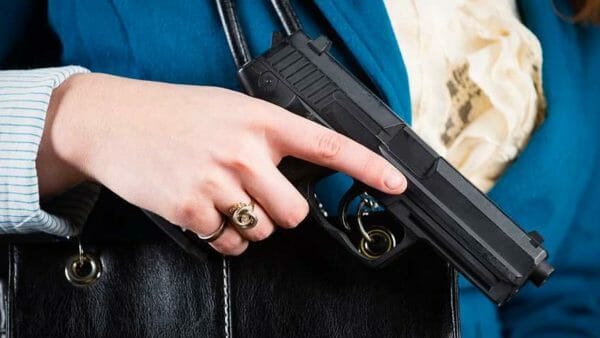
U.S.A. -(AmmoLand.com)- Longtime gun rights supporters know that gun owners need to stick together. Over/under shotgun and revolver aficionados help to fight semi-automatic bans, because their guns would be next on the chopping block. Those over 21 fight firearms restrictions on 18-21-year-olds, because such gun controls diminish the Second Amendment right, deter future gun owners, and weaken the shooting community. Hunters with access to sufficient private land fight for greater hunting access to public land to help ensure more hunters can take to the field, thus preserving America’s hunting heritage.
The point is that when working to advance Second Amendment rights, not every piece of legislation will impact a given gun rights supporter directly. However, such legislation may still be vital to the broad goals of the Second Amendment community.
Consider state legislation to provide outright recognition of Right-to-Carry permits from all other states. The benefits of such legislation may not be immediately apparent to Right-to-Carry permit holders in the state, as it will not directly affect their ability to carry. However, such legislation is vital to breaking down the broad legal barriers to exercising the Second Amendment right, shifting cultural norms around firearms and the Right-to-Carry, and even has nonobvious practical benefits to in-state gun owners.
A top priority for gun rights supporters at the federal level is national Right-to-Carry reciprocity legislation. On January 4, Rep. Richard Hudson (R-N.C.) introduced H.R.38, or the Concealed Carry Reciprocity Act. The legislation would ensure that Right-to-Carry permit holders could carry throughout the country, and that their permits were recognized by every state.
Important federal legislation like H.R.38 often has a political tipping point, where such legislation is enacted once the change it would bring about is already the status quo in enough states. At present, 20 states grant outright recognition to Right-to-Carry permits from all other states. Moreover, three additional states allow law-abiding non-residents to carry regardless of whether they have a Right-to-Carry permit.
The more states that enact outright recognition legislation, the more outright recognition becomes the national standard for the Right-to-Carry. This in turn will help to move the ball forward on federal national Right-to-Carry legislation that will ensure law-abiding citizens from across the country are able to carry for self-defense in the remaining intransigent jurisdictions like New York and California.
Outright recognition legislation can have even broader implications for the fight to protect the Second Amendment, as it further acculturates society to lawful individuals carrying a firearm for self-defense. Consider how attitudes around handguns have changed since the Right-to-Carry movement began in Florida in 1987. That year a Gallup poll asked survey-takers “Do you think there should or should not be a law that would ban the possession of handguns, except by the police and other authorized persons?” 42 percent of respondents answered in the affirmative and only 50 percent outright opposed such a measure. In October 2020 Gallup asked the same question. A mere 25 percent of 2020 respondents favored a handgun ban while a whopping 74 percent opposed a prohibition.
As Americans become more accustomed to carrying a firearm for self-defense, become aware of a friend or family member that does so, or notice that an increase in the exercise of the Right-to-Carry does not increase violent crime, their broad attitudes on gun control shift. Outright recognition legislation helps to continue this process by further protecting and encouraging the exercise of the Right-to-Carry.
Moreover, outright recognition legislation can have direct positive benefits to in-state gun owners that may not be readily apparent.
According to the Census Bureau, in 2019 about 7.4 million Americans moved to a new state of residence. Some data suggests that this number may be even higher in 2020, due in part to the COVID-19 pandemic.
Those who move states due to schooling, better economic prospects, politics, or family reasons often keep close ties to their state of origin. Outright recognition in the state of origin ensures that those who move will be able to exercise their Right-to-Carry when returning to visit their family and friends.
Outright recognition ensures that a daughter who has gone away to college in another state can carry for self-defense while at home on break. Such legislation ensures that a young couple who moved out of state for new jobs can be protected on their trip back for Thanksgiving.
It is essential that all gun owners work together to enact pro-gun measures like outright recognition legislation. While the immediate benefits of a given policy might not accrue to every individual gun owner, gun rights supporters should know that their hard work will always pay intangible and practical dividends down the road.
About NRA-ILA:
Established in 1975, the Institute for Legislative Action (ILA) is the “lobbying” arm of the National Rifle Association of America. ILA is responsible for preserving the right of all law-abiding individuals in the legislative, political, and legal arenas, to purchase, possess, and use firearms for legitimate purposes as guaranteed by the Second Amendment to the U.S. Constitution. Visit: www.nra.org

The post Recognition for Right-to-Carry Permits Helps Protect All Gun Owners appeared first on AmmoLand.com.
from https://ift.tt/3rgI3yd
via IFTTT

No comments:
Post a Comment